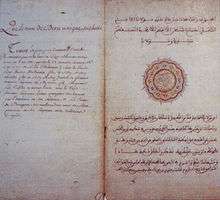Larache expedition
| Larache expedition | |||||||
|---|---|---|---|---|---|---|---|
| Part of Franco-Moroccan conflicts | |||||||
 The fortress of Larache was attacked by a French fleet in June 1765. | |||||||
| |||||||
| Belligerents | |||||||
|
|
| ||||||
| Commanders and leaders | |||||||
| Duchaffault de Besné | |||||||
| Strength | |||||||
| 16 warships | |||||||
| Casualties and losses | |||||||
|
200 dead 50 captured | Unknown | ||||||
The Larache expedition occurred in June 1765 when French Navy troops attacked the Moroccan city of Larache following a bombardment of Salé and Rabat.[1] It is an example of the sporadic failure of Western arms against local forces in colonial campaigns.[2]
After the end of the Seven Years' War, France turned its attention to the Barbary corsairs, especially those of Morocco, who had taken advantage of the conflict to attack Western shipping.[3]
A French squadron was led by Duchaffault de Besné, comprising a 52-gun ship Utile and 15 frigates, xebecs and galliots.[3] The 30-gun Héroine was commanded by Captain De Grasse.[3] The xebec Singe was under the command of Pierre André de Suffren de Saint Tropez.[3] It arrived in front of Larache on 26 June 1765, after a successful bombardment of Salé between 2 and 11 June.[3]

Larache was bombarded successfully on the 27th and 28th, and the city was evacuated.[3] Some small boats of the French squadron under Captain Latouche Beauregard sailed up the Lixa river, in an attempt to set fire to some Moroccan ships. This force was encircled by the Moroccans. Seven small boats were captured, while nine were able to return to the squadron. 200 French sailors were killed, and 48 were captured and enslaved.[1][3] One of the captives, Bidé de Maurville, who remained in captivity for two years, wrote in 1775 an account of the expedition, in Relation de l'affaire de Larache.[1]
The captured men are said to have participated in the construction of the city of Essaouira, which was being designed by Theodore Cornut for the ruler of Morocco, Mohammed ben Abdallah.
The fleet was unable to recover the prisoners or to inflict retribution on Moroccan forces. This was a low point for the French Navy, after the Seven Years' War, and before the revival of the French fleet at the end of the 18th century.[3]

The defeat at Larache led to a truce and a treaty between France and Morocco in 1767, with terms which were nevertheless favourable to French trade.[4]
See also
Notes
- 1 2 3 Note to The History and Description of Africa and of the Notable Things Therein Leo Africanus, p.616
- ↑ From Louis XIV to Napoleon: the fate of a great power Jeremy Black p.200
- 1 2 3 4 5 6 7 8 Admiral de Grasse and American independence by Charles A. Lewis, Charles Lee Lewis p.41ff
- ↑ "The defeat of the French forces in Larache in 1765 did not prevent Muhammad III from proposing a truce and pressing for the conclusion of a treaty of peace, which was only signed in 1767 and which was "very advantageous to French trade"" in The Atlantic connection: 200 years of Moroccan-American relations, 1786-1986 Jerome B. Bookin-Weiner, Mohamed El Mansour Edino, 1990, p.45